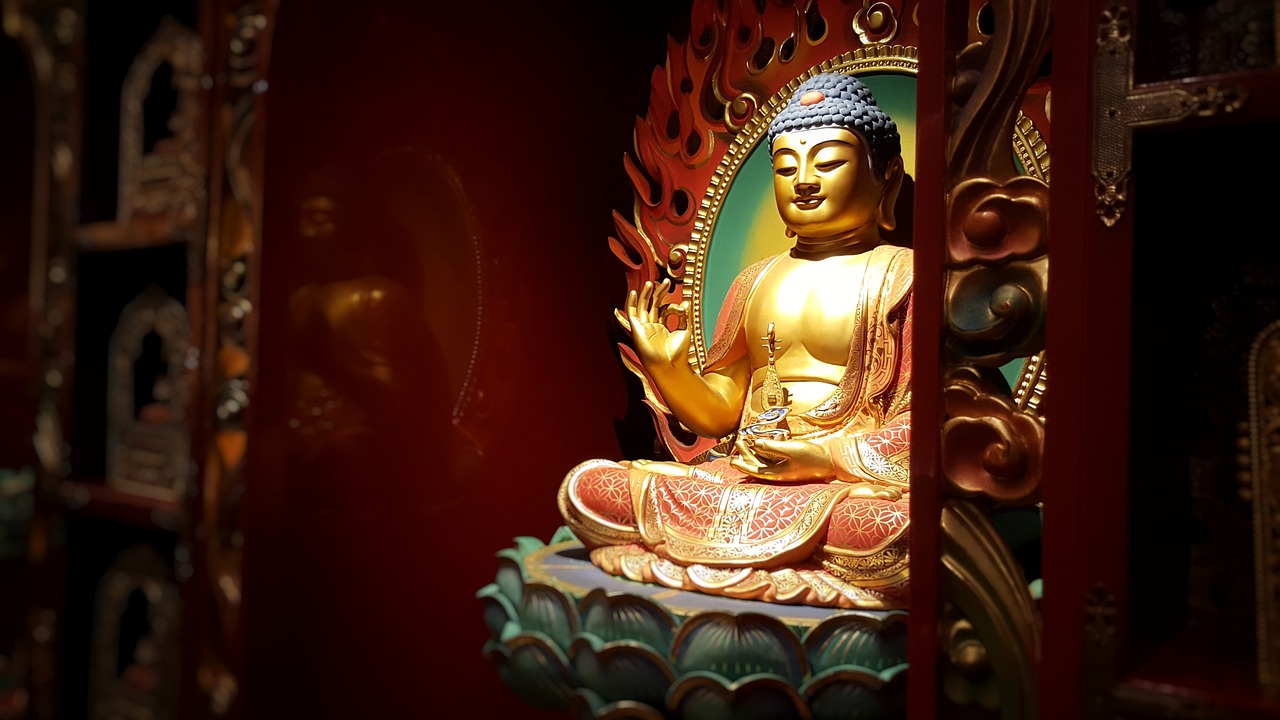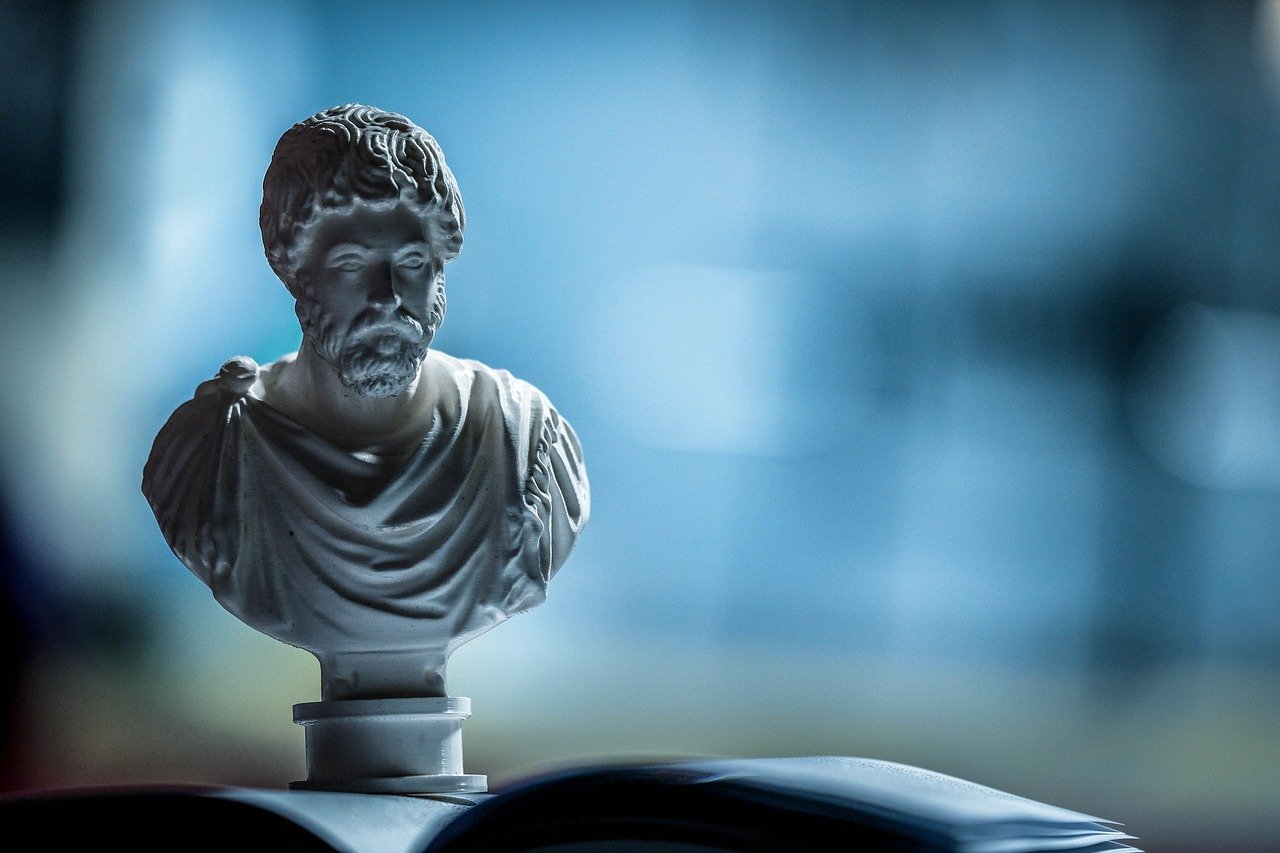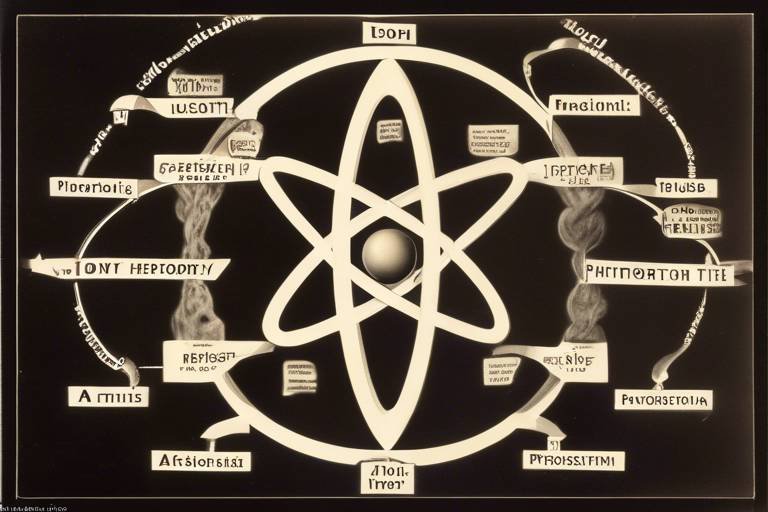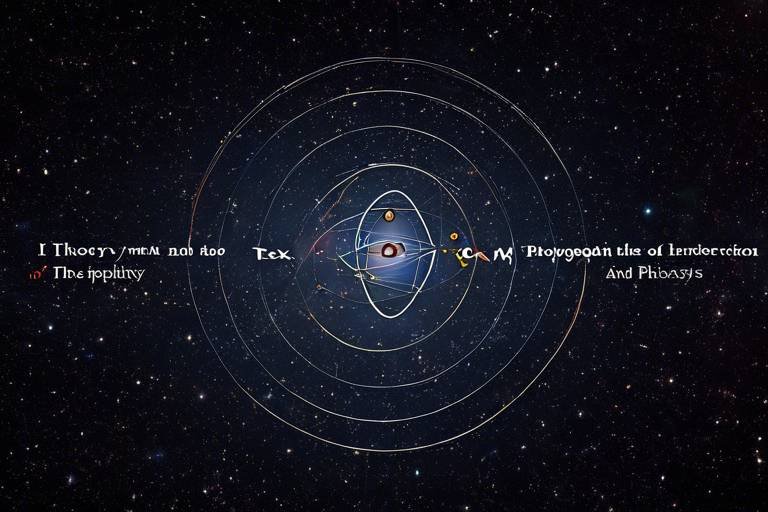The Philosophical Inquiry into the Nature of Life after Death
The concept of life after death has intrigued humanity for centuries, prompting deep philosophical inquiries that traverse cultures, religions, and individual beliefs. What happens when we take our last breath? Is there a continuation of consciousness, or do we simply cease to exist? These questions not only haunt our minds but also shape our ethical frameworks, societal structures, and personal choices. The exploration of life after death is not just a quest for answers; it is a journey into understanding what it means to be human, to live, and to grapple with the inevitable end of life.
Throughout history, the idea of an afterlife has been a powerful force, influencing art, literature, and religious practices. From the ancient Egyptians, who meticulously prepared for the afterlife with elaborate burial rituals, to modern philosophical debates that challenge the very fabric of existence, the inquiry into life beyond death is as vibrant today as it has ever been. Philosophers have delved into metaphysical arguments, scrutinizing the nature of consciousness and identity, while existentialists have pondered the implications of mortality on the human experience.
At its core, the philosophical inquiry into life after death invites us to confront our own mortality. It raises profound questions about the essence of our being and whether our actions in this life carry significance beyond the grave. Are we merely biological entities, or is there something more—an eternal aspect of ourselves that transcends physical existence? This inquiry not only challenges our understanding of life but also compels us to reflect on our values, relationships, and the legacies we leave behind.
As we navigate through the myriad of beliefs and theories surrounding life after death, we find ourselves at a crossroads of faith and reason. The philosophical debate is rich and complex, often leading to more questions than answers. Yet, it is this very uncertainty that makes the discussion so compelling. The search for meaning in the face of death is a universal human experience, one that connects us across time and space, prompting us to seek understanding in a world that often feels chaotic and unpredictable.
In this article, we will explore various philosophical perspectives, historical beliefs, and contemporary views on life after death. From dualism and materialism to religious doctrines and modern scientific inquiries, the spectrum of thought is vast. Each perspective offers unique insights into the nature of existence and the possibilities that lie beyond our earthly experience. So, let’s embark on this philosophical journey together, unraveling the mysteries of life after death, and perhaps discovering a deeper understanding of ourselves along the way.
- What is the main philosophical question regarding life after death? The central question is whether consciousness persists after physical death and what that means for personal identity.
- How do different cultures view life after death? Various cultures have distinct beliefs about the afterlife, ranging from reincarnation in Eastern philosophies to the concept of heaven and hell in Christianity.
- What role do existentialist thinkers play in this discussion? Existentialists examine how beliefs about mortality influence human experience, purpose, and the search for meaning in life.
- Are there scientific perspectives on life after death? Modern science, particularly in neuroscience and psychology, explores consciousness and the possibility of an afterlife through empirical research and theories.

[Historical Perspectives on Life after Death]
Throughout the ages, the concept of life after death has captivated the human imagination, leading to a myriad of interpretations across different cultures and religions. From the ancient Egyptians, who meticulously prepared for the afterlife with elaborate burial rituals and tombs filled with treasures, to the philosophies of the Greeks, who pondered the fate of the soul, the quest to understand what lies beyond this life has been a fundamental aspect of human existence.
In ancient Egypt, the belief in an afterlife was intricately woven into the fabric of society. The Egyptians viewed the afterlife as a continuation of life on earth, where one's deeds during their lifetime would determine their fate. The Book of the Dead, a collection of spells and prayers, was essential for guiding the deceased through the perilous journey to the afterlife. The heart of the deceased was weighed against the feather of Ma'at, symbolizing truth and justice, to determine whether they would be granted eternal life or devoured by the monster Ammit.
Meanwhile, in ancient Greece, philosophers like Plato and Aristotle explored the nature of the soul and its immortality. Plato, in particular, argued that the soul is eternal and exists before and after the body. He believed that knowledge is a form of recollection, implying that the soul experiences multiple lives, learning and evolving through each incarnation. This cyclical view of existence laid the groundwork for many later philosophical and religious beliefs about reincarnation and the afterlife.
In contrast, the early Christian perspective introduced a more linear view of life after death. Christianity posits a definitive judgment after death, where souls are either rewarded with eternal life in heaven or punished in hell. This belief in salvation through faith and the resurrection of Jesus Christ became central tenets of Christian doctrine, profoundly influencing Western thought on morality and the afterlife.
As we delve deeper into the historical perspectives on life after death, we can observe a fascinating evolution of thought. The table below summarizes some key beliefs from various cultures:
| Culture/Religion | Belief about Afterlife |
|---|---|
| Ancient Egypt | Afterlife is a continuation of earthly life; judged by the heart's purity. |
| Ancient Greece | The soul is immortal and undergoes cycles of rebirth; knowledge is recollection. |
| Christianity | Judgment after death leading to heaven or hell based on faith and deeds. |
| Hinduism | The soul reincarnates based on karma until achieving moksha (liberation). |
| Buddhism | Rebirth influenced by karma; ultimate goal is to attain Nirvana and escape suffering. |
This table illustrates the rich tapestry of beliefs that have emerged throughout history, each contributing to our understanding of mortality and the afterlife. These diverse perspectives not only reflect the values and ethics of their respective cultures but also highlight the universal human desire to comprehend what happens after we take our last breath.
In summary, the historical perspectives on life after death reveal a complex interplay of beliefs that have shaped human thought across civilizations. Whether through elaborate rituals, philosophical inquiries, or religious doctrines, the quest for understanding our existence beyond this life continues to be a profound and enduring aspect of the human experience.

[Philosophical Arguments for Life after Death]
The question of whether life after death exists has captivated human thought for centuries. Philosophers, theologians, and everyday individuals have grappled with this profound inquiry, each offering unique perspectives that challenge our understanding of existence. One of the strongest philosophical arguments for life after death is rooted in metaphysical reasoning. This approach posits that our consciousness cannot simply be a byproduct of physical processes, suggesting instead that it possesses a non-material essence that transcends the physical body. Think about it: if our thoughts, emotions, and memories are merely chemical reactions, then what happens to them when our bodies cease to function? This leads to the intriguing possibility that our consciousness could persist beyond our earthly existence.
Another compelling argument comes from moral implications. If we accept that our actions have consequences that extend beyond our physical lives, it raises the stakes for ethical behavior. The belief in an afterlife often serves as a moral compass, motivating individuals to act virtuously with the hope of achieving a favorable outcome in the hereafter. This perspective can be summarized in the following points:
- Accountability: The notion that our actions have eternal consequences encourages individuals to live ethically.
- Purpose: Belief in an afterlife can provide a sense of purpose and direction in life.
- Hope: The idea of life after death offers comfort in the face of mortality.
Furthermore, existential inquiries delve into how our beliefs about life after death shape our human experience. Existentialist philosophers argue that the awareness of our mortality influences our choices, relationships, and ultimately, our pursuit of meaning. Without the prospect of an afterlife, one might question the significance of their actions, as everything could seem fleeting and inconsequential. This existential angst often drives individuals to seek deeper connections and a more profound understanding of their place in the universe, making the concept of an afterlife not just a question of existence, but a critical element of the human condition.
The debate between dualism and materialism further complicates our understanding of life after death. Dualists, like René Descartes, argue that the mind and body are distinct entities, allowing for the possibility of the soul's immortality. In contrast, materialists contend that consciousness is entirely dependent on physical processes. They assert that once the body dies, consciousness ceases to exist. This clash between perspectives raises significant questions about personal identity and the nature of consciousness itself. If consciousness can exist independently of the body, what does that mean for our understanding of self and existence?
Ultimately, the philosophical arguments for life after death challenge us to ponder the nature of reality, consciousness, and morality. They invite us to explore not only what it means to live but also what it means to exist beyond the confines of our physical bodies. The implications of these arguments resonate deeply, prompting us to reflect on our beliefs, our actions, and our ultimate fate.
- What are the main philosophical arguments for life after death?
The main arguments include metaphysical reasoning, moral implications, and existential inquiries that explore the nature of consciousness and identity. - How do dualism and materialism differ in their views on consciousness?
Dualism posits that the mind and body are separate, allowing for the possibility of an afterlife, while materialism argues that consciousness is a product of physical processes that cease upon death. - What role does belief in an afterlife play in moral behavior?
Belief in an afterlife can motivate individuals to act ethically, as it implies accountability for one's actions beyond this life.

[Dualism vs. Materialism]
The debate between dualism and materialism is a fundamental philosophical inquiry that has captivated thinkers for centuries. At its core, this discourse revolves around the nature of the mind and body, and whether they exist as separate entities or as a unified whole. Dualists, like the renowned philosopher René Descartes, argue that the mind and body are distinct, suggesting that our consciousness, or soul, can exist independently of our physical form. This perspective opens up the tantalizing possibility of an afterlife, where the essence of who we are persists beyond the decay of our bodies.
On the other hand, materialists contend that everything about consciousness can be traced back to physical processes within the brain. They assert that once the body ceases to function, so too does our individual identity and awareness. This viewpoint challenges traditional notions of an afterlife, positing instead that our experiences, memories, and even our very selves are merely products of our biological makeup. The implications of this debate are profound, as they shape not only our understanding of life after death but also our approach to ethics, morality, and the essence of human existence.
To better illustrate the contrasting views, consider the following table:
| Aspect | Dualism | Materialism |
|---|---|---|
| Nature of Existence | Mind and body are distinct | Mind is a product of physical processes |
| Afterlife | Possibility of existence beyond death | No existence after death |
| Philosophical Implications | Questions of personal identity and consciousness | Focus on biological and neurological explanations |
This philosophical clash raises intriguing questions: If the mind can exist apart from the body, what does that mean for our understanding of personal identity? Conversely, if we are merely the sum of our biological parts, how do we account for the richness of human experience? Such inquiries not only challenge our perceptions of life and death but also compel us to reflect on the very nature of our reality.
In essence, the dualism versus materialism debate invites us to ponder the mysteries of consciousness and existence. It encourages us to explore the boundaries of what we know and to consider the profound implications of our beliefs about life after death. Whether one leans towards the idea of a transcendent soul or a purely physical existence, this philosophical inquiry remains a cornerstone of our quest for understanding the nature of life itself.
- What is dualism? Dualism is the belief that the mind and body are separate entities, allowing for the possibility of an afterlife.
- What do materialists believe? Materialists argue that consciousness arises from physical processes, meaning that individual identity ceases to exist after death.
- How does this debate affect our understanding of life after death? The dualism vs. materialism debate shapes our beliefs about the possibility of an afterlife and influences our ethical and existential inquiries.

[René Descartes' Dualism]
René Descartes, often hailed as the father of modern philosophy, introduced a revolutionary concept known as dualism. This philosophical stance posits that the mind and body are fundamentally distinct entities. Descartes argued that while our physical bodies are made of matter and governed by the laws of physics, our minds—or souls—are non-material and possess a unique essence that transcends the physical realm. This separation raises profound questions about the nature of existence and our understanding of consciousness.
At the heart of Descartes' dualism lies the idea of the immortality of the soul. He believed that the soul could exist independently of the body, which implies that even after death, our consciousness could persist. This notion challenges the very fabric of materialism, which asserts that all aspects of our being are rooted in physical processes. Descartes famously stated, "I think, therefore I am," emphasizing that the act of thinking is proof of one's existence. This leads us to ponder: if our thoughts can exist apart from our physical form, what does that mean for our identity and continuity after death?
To further illustrate Descartes' ideas, consider the following comparisons:
| Aspect | Dualism (Descartes) | Materialism |
|---|---|---|
| Nature of Existence | Mental and physical are separate | Everything is physical |
| Consciousness | Can exist independently of the body | Emerges from brain activity |
| Afterlife | Possible existence of the soul post-mortem | Ceases with bodily death |
This dualistic perspective has significant implications for our understanding of personal identity. If the mind can survive the death of the body, what does that mean for our relationships, memories, and experiences? Descartes' philosophy invites us to explore the essence of who we are beyond our physical selves. It also raises ethical questions: if our thoughts and experiences can exist in a non-physical form, how should we approach the lives we lead now? Are our actions merely transient, or do they hold eternal significance?
In essence, Descartes' dualism opens the door to a myriad of philosophical inquiries about life after death. It encourages us to reflect on our beliefs regarding consciousness and existence, pushing the boundaries of how we understand mortality. As we navigate through these complex questions, we find ourselves at the intersection of philosophy, science, and spirituality, each offering unique insights into the mystery of life beyond the grave.
- What is dualism? Dualism is the philosophical view that the mind and body are fundamentally different in nature.
- How does Descartes' dualism relate to life after death? Descartes believed that the soul could exist independently of the body, suggesting the possibility of life after death.
- What are the implications of dualism for personal identity? Dualism raises questions about the nature of identity, suggesting that our consciousness may persist beyond physical death.

[Materialist Perspectives]
The materialist perspective on life after death is rooted in the belief that consciousness is fundamentally tied to the physical body. Materialists argue that all mental states, thoughts, and experiences arise from biological processes within the brain. This viewpoint challenges the notion of an afterlife by positing that when the body ceases to function, so too does consciousness. To materialists, the idea of an enduring self that exists beyond physical demise is not only unfounded but also counterintuitive to our understanding of science and biology.
One of the central arguments made by materialists is that there is no empirical evidence supporting the existence of an afterlife. They contend that anecdotal accounts of near-death experiences or claims of communication with the deceased lack scientific rigor and should be viewed with skepticism. This skepticism leads to a broader philosophical inquiry: if our thoughts and identities are merely byproducts of our neural networks, what happens to those thoughts when the brain shuts down? For materialists, the answer is clear—the individual ceases to exist in any meaningful way.
Moreover, materialists often point to the advancements in neuroscience that have illuminated the intricate workings of the brain. As we learn more about how our cognitive functions arise from electrochemical processes, the idea of a non-physical soul becomes increasingly difficult to reconcile with observed reality. The implications of this perspective are profound, as they suggest a finite existence where the quest for meaning must be rooted in the here and now, rather than in an imagined afterlife.
In contrast to dualist views, which propose a separation between mind and body, materialism emphasizes a holistic understanding of human experience. This perspective can be summarized as follows:
| Aspect | Materialist Perspective | Dualist Perspective |
|---|---|---|
| Nature of Consciousness | Emerges from physical processes | Separate from the physical |
| Afterlife Belief | Non-existent | Possible existence of the soul |
| Identity | Ceases with brain function | Endures beyond death |
This materialist view leads to profound existential questions. If we accept that our time is limited and that we are products of our biological makeup, how do we derive meaning from our lives? Materialists argue that meaning is not something that exists outside of us; rather, it is something we create through our relationships, experiences, and contributions to society. In this sense, the focus shifts from an uncertain afterlife to the richness of living fully in the present.
Ultimately, the materialist perspective invites us to confront our mortality without the comfort of an afterlife. It challenges us to find purpose in the finite nature of our existence, emphasizing that the legacy we leave behind is woven into the fabric of human experience, rather than a promise of eternal life. This approach can be both liberating and daunting, as it encourages individuals to live authentically and intentionally, fully aware that this life is all we have.
- What do materialists believe happens after death? Materialists generally believe that consciousness ceases to exist once the body dies, as they view mental states as products of physical processes.
- Are there any scientific studies supporting materialism? Yes, advancements in neuroscience have provided insights into how brain functions correlate with consciousness, reinforcing materialist views.
- How do materialists find meaning in life? Materialists often find meaning through relationships, experiences, and contributions to society, rather than through beliefs in an afterlife.

[Existential Implications]
The exploration of life after death is not just an abstract philosophical exercise; it profoundly influences how we live our lives today. The existential implications of believing in an afterlife can shape our values, motivations, and even our everyday choices. When we ponder the possibility of existence beyond our physical bodies, we often find ourselves confronting some of life's most pressing questions: What is the meaning of life? How should we treat others? What legacy do we want to leave behind?
Existentialists argue that the awareness of our mortality can lead to a more authentic existence. The fleeting nature of life can serve as a catalyst for individuals to seek deeper connections and experiences. For instance, if we accept that our time is limited, we might prioritize relationships over material possessions, fostering a sense of community and shared humanity. This perspective encourages us to live fully in the present, making every moment count.
Moreover, the belief in an afterlife can offer comfort in times of grief. For many, the idea that loved ones continue to exist in some form provides solace amid the pain of loss. It can create a framework for understanding death not as an end, but as a transition. This belief can be particularly powerful in cultures where the afterlife is celebrated and integrated into mourning rituals, allowing individuals to process their grief in a supportive context.
On the flip side, the absence of an afterlife can lead to a sense of urgency and responsibility. If we believe that this life is all we have, it may compel us to focus on making a tangible impact in the world. This perspective can inspire individuals to engage in social justice, environmental stewardship, and community building, as they recognize the importance of their actions in shaping the future for others.
In essence, the implications of our beliefs about life after death are profound and multifaceted. They challenge us to consider our purpose, our relationships, and our responsibilities to ourselves and to others. As we navigate these existential questions, we might find that the quest for meaning is just as significant as any answers we may seek.
To further explore these ideas, here are a few key questions that often arise in discussions about existential implications:
- How does the belief in an afterlife influence ethical behavior?
- Can the fear of death motivate positive change in individuals?
- What role does hope play in shaping our understanding of existence?
Ultimately, grappling with the existential implications of life after death can lead to a richer, more meaningful life. Whether one believes in a continuation of existence or the finality of death, the search for purpose and connection remains a universal human experience.
- What are the main philosophical arguments for life after death?
Philosophers argue from various angles, including dualism, moral implications, and existential inquiries, suggesting that consciousness may persist beyond physical death. - How do different religions view the afterlife?
Religions such as Christianity emphasize eternal life through salvation, while Eastern philosophies like Hinduism and Buddhism focus on rebirth and karma. - Can belief in life after death affect mental health?
Yes, beliefs about the afterlife can provide comfort in grief and motivate individuals to lead meaningful lives, impacting overall mental well-being.

[Religious Views on the Afterlife]
When it comes to the concept of life after death, religion plays a pivotal role in shaping beliefs and practices across cultures. Each tradition offers its own unique interpretation of what happens after we take our last breath, providing followers with profound frameworks to understand mortality and the fate of the soul. From the promise of eternal life in Christianity to the cycles of rebirth in Eastern philosophies, these views not only influence individual lives but also impact societal norms and ethical considerations.
In Christianity, the belief in an afterlife is central to the faith. Christians hold that through faith in Jesus Christ, individuals can attain eternal life. This doctrine emphasizes not only salvation but also the resurrection of the body and the existence of heaven and hell. The concept of heaven is viewed as a place of eternal bliss and communion with God, while hell is often depicted as a realm of suffering for those who reject divine grace. This dichotomy serves as a moral compass for believers, guiding their actions and decisions in life.
On the other hand, Eastern philosophies, such as Hinduism and Buddhism, present a different perspective on the afterlife. These traditions embrace the idea of rebirth, where the soul undergoes cycles of reincarnation influenced by karma—the cumulative effects of one’s actions. In Hinduism, the ultimate goal is to achieve moksha, or liberation from the cycle of birth and death, allowing the soul to unite with the divine. Buddhism, similarly, teaches that through enlightenment, one can break free from the cycle of suffering known as samsara. This belief encourages followers to live ethically and mindfully, as their actions directly impact their future existences.
Interestingly, the views on the afterlife are not monolithic even within these major religions. For instance, within Christianity, there are varying interpretations of heaven and hell, as well as differing beliefs about purgatory—a temporary state of purification for souls before entering heaven. Similarly, within Hinduism, the paths to moksha can vary significantly, with some emphasizing devotion to deities while others focus on meditation and self-realization.
To further illustrate the diversity of religious views on the afterlife, the table below summarizes key beliefs across different traditions:
| Religion | View on Afterlife | Key Concepts |
|---|---|---|
| Christianity | Eternal life through faith | Heaven, Hell, Salvation |
| Hinduism | Rebirth until liberation | Karma, Moksha |
| Buddhism | Cycle of rebirth | Samsara, Enlightenment |
| Islam | Judgment Day | Paradise, Hellfire |
In addition to these major religions, many indigenous and spiritual belief systems also offer their own interpretations of what lies beyond death. For instance, some cultures believe in ancestral spirits guiding the living, while others see death as a transition to another realm where the deceased continue to exist among the living in a different form. These beliefs highlight the rich tapestry of human thought regarding mortality and the afterlife.
Ultimately, the religious views on life after death serve not only as a source of comfort but also as a profound motivator for ethical living. They encourage individuals to reflect on their actions and the legacy they leave behind, fostering a sense of connection to something greater than themselves. In a world filled with uncertainty about what happens after we die, these beliefs offer a guiding light, illuminating the path of existence beyond the physical realm.
- What are the main beliefs about the afterlife in Christianity?
Christianity teaches that believers will have eternal life in heaven through faith in Jesus Christ, while those who reject Him face eternal separation in hell. - How do Eastern philosophies view life after death?
Hinduism and Buddhism emphasize rebirth and karma, where the soul undergoes cycles of reincarnation until achieving enlightenment or liberation. - Are there differing views within the same religion?
Yes, many religions have various interpretations and beliefs about the afterlife, even among their own followers. - What role does ethical living play in these beliefs?
Religious views on the afterlife often encourage individuals to live ethically, as their actions can influence their fate in the afterlife.

[Christianity and Eternal Life]
Christianity stands as one of the most influential religions when it comes to the concept of life after death. At the heart of Christian belief is the promise of eternal life, a doctrine that brings hope and purpose to millions around the globe. This belief is intricately tied to the figure of Jesus Christ, whose life, death, and resurrection serve as the cornerstone of this faith. For Christians, the idea of eternal life is not merely a distant hope but a present reality that shapes their daily lives and moral choices.
Central to this belief is the notion of salvation. Christians believe that accepting Jesus as their Lord and Savior grants them access to eternal life. This is often encapsulated in the famous verse from the Bible: "For God so loved the world that he gave his one and only Son, that whoever believes in him shall not perish but have eternal life" (John 3:16). This verse highlights the importance of faith in Jesus, suggesting that through belief, individuals can transcend physical death and enjoy a relationship with God in eternity.
The dichotomy of heaven and hell is another significant aspect of Christian eschatology. Heaven is portrayed as a place of eternal joy and communion with God, while hell is depicted as a state of separation from Him, often characterized by suffering and despair. This duality serves not only as a moral compass but also as a motivator for ethical living among believers. The idea that one's actions in this life can influence their eternal fate adds a profound weight to moral decisions, encouraging adherents to live righteously.
Furthermore, the resurrection of the dead is a critical element of Christian theology. Christians believe that at the end of times, all individuals will be resurrected and judged by Christ. This belief is articulated in the Apostles' Creed, which states, “I believe in the resurrection of the body, and the life everlasting.” This resurrection is not merely a spiritual awakening but a physical one, where believers will receive glorified bodies, free from the limitations and suffering of earthly existence.
In addition to these core beliefs, various Christian denominations interpret the concept of eternal life in diverse ways. While some emphasize the importance of faith alone, others highlight the necessity of good works as evidence of genuine belief. This leads to a rich tapestry of theological discussions and debates within Christianity, as different groups seek to understand the implications of eternal life in light of scripture and tradition.
Overall, the Christian perspective on eternal life offers a framework that not only addresses the fear of death but also provides a profound sense of purpose and direction in life. It encourages believers to live with hope, knowing that their actions today resonate in the eternal realm. This belief is a source of comfort, guiding Christians through the trials and tribulations of life with the assurance that there is something greater awaiting them beyond the grave.
Frequently Asked Questions
- What is the basis for the belief in eternal life in Christianity?
The belief is primarily based on the teachings of Jesus Christ and the scriptures, particularly the New Testament, which emphasizes faith in Christ as the pathway to eternal life.
- How do different denominations view eternal life?
While all Christian denominations believe in some form of eternal life, interpretations of how one attains it can vary. Some emphasize faith alone, while others incorporate the importance of good works.
- What role does judgment play in Christian beliefs about the afterlife?
Judgment is a crucial aspect, as Christians believe that all individuals will be judged by Christ, determining their eternal fate based on their faith and actions during their lifetime.

[Eastern Philosophies and Rebirth]
Eastern philosophies, particularly those rooted in Hinduism and Buddhism, present a fascinating tapestry of beliefs concerning life after death. These traditions introduce the concept of rebirth, a cycle where the soul undergoes multiple incarnations until it reaches a state of enlightenment or liberation. This belief system diverges sharply from the Western notion of a singular afterlife, offering a more cyclical view of existence that resonates with the natural rhythms of life.
In Hinduism, the idea of karma plays a pivotal role in shaping one's future lives. Each action, whether good or bad, creates an imprint that influences the circumstances of future births. This intricate dance of cause and effect means that one's current life is a reflection of past deeds, and the choices made today will echo into the future. It’s almost like a cosmic ledger where every action is recorded, leading to a complex web of consequences that dictate the soul's journey through the material world.
On the other hand, Buddhism emphasizes the concept of nirvana, which represents the ultimate goal of liberation from the cycle of rebirth. The Buddha taught that life is inherently tied to suffering, and the path to enlightenment involves understanding the nature of this suffering and breaking free from it. The cycle of samsara, or the continuous cycle of birth, death, and rebirth, is something that every sentient being seeks to escape. This journey is not just about personal salvation; it also involves compassion for all beings, recognizing that everyone is caught in this cycle.
Both traditions encourage a deep introspection and ethical living, suggesting that how one lives greatly influences their spiritual trajectory. In essence, they advocate for a life of mindfulness and virtue, where the ultimate aim is not just to exist but to transcend the limitations of the physical world. This perspective invites individuals to view their lives as part of a larger cosmic cycle, fostering a sense of responsibility towards oneself and others.
To illustrate these concepts further, let's take a look at a simple comparison of the beliefs surrounding rebirth in these two philosophies:
| Aspect | Hinduism | Buddhism |
|---|---|---|
| Core Belief | Reincarnation based on karma | Cycle of samsara, aim for nirvana |
| Ultimate Goal | Moksha (liberation from the cycle) | Nirvana (cessation of suffering) |
| Role of Karma | Determines future births | Influences the cycle but not the ultimate escape |
| Ethical Living | Essential for good karma | Path to enlightenment and compassion |
In conclusion, Eastern philosophies provide profound insights into the nature of life, death, and rebirth. They challenge us to think beyond the conventional boundaries of existence, urging us to consider our actions and their ripple effects in the grand tapestry of life. By embracing these teachings, we can cultivate a deeper understanding of our place in the universe and strive towards a more enlightened existence.
- What is the difference between reincarnation and rebirth? Reincarnation generally refers to the soul being born into a new body, while rebirth can encompass a broader understanding of the cycle of life and death, including the idea of continuous becoming.
- How does karma affect rebirth? Karma, or the law of cause and effect, dictates the conditions of one’s future lives based on past actions, influencing the circumstances of rebirth.
- Can one escape the cycle of rebirth? Yes, both Hinduism and Buddhism offer paths to liberation—Moksha in Hinduism and Nirvana in Buddhism—allowing individuals to transcend the cycle of samsara.

[Contemporary Perspectives on Life after Death]
In today's world, the question of what happens after we take our last breath has not lost its allure. In fact, it has grown even more intriguing as modern thinkers, scientists, and philosophers dive deep into the mysteries of existence beyond the physical realm. With advancements in neuroscience and psychology, the age-old question of life after death is being examined through a new lens, one that melds spirituality with empirical evidence. This intersection of science and spirituality is not just a passing trend; it's a profound inquiry into the nature of consciousness and what it means to be alive.
One of the most fascinating aspects of contemporary perspectives on life after death is the exploration of near-death experiences (NDEs). Many individuals who have come close to death report vivid experiences that often include feelings of peace, encounters with deceased loved ones, and even life reviews. These accounts challenge the traditional materialist view that consciousness ceases to exist when the body dies. Instead, they suggest that consciousness may be a more complex phenomenon than we previously understood. Researchers are now investigating these experiences scientifically, aiming to uncover whether they are mere hallucinations or if they hint at something more profound.
Moreover, the rise of transhumanism has sparked discussions about the potential for life after death in a radically different sense. Transhumanists advocate for the use of technology to enhance human capabilities and extend life. Some even propose that consciousness could be uploaded to a digital medium, allowing individuals to exist in a virtual realm long after their physical bodies have perished. This idea raises ethical questions and challenges our traditional notions of identity and existence. Can a digital copy of a person truly represent their essence? Or is the physical body an irreplaceable vessel for our consciousness?
Additionally, the integration of spiritual practices into modern psychology is reshaping our understanding of life after death. Mindfulness, meditation, and other spiritual exercises are being studied for their effects on mental well-being and existential peace. These practices often lead individuals to contemplate their mortality and the possibility of an afterlife, fostering a sense of connection to something greater than themselves. As more people embrace these practices, they often report a shift in their beliefs about life after death, leaning towards a more hopeful and expansive view.
To further illustrate the contemporary views on life after death, let's take a look at a table highlighting some key perspectives:
| Perspective | Description |
|---|---|
| Near-Death Experiences | Reports of consciousness and vivid experiences during close encounters with death, suggesting a possible continuation of consciousness. |
| Transhumanism | The belief in enhancing human capabilities through technology, including the potential for digital immortality. |
| Spiritual Psychology | The integration of spiritual practices in psychology, promoting mindfulness and existential exploration related to life after death. |
As we navigate these fascinating discussions, it's essential to acknowledge that the question of life after death remains deeply personal and subjective. Each individual's beliefs are shaped by their experiences, cultural backgrounds, and philosophical inclinations. The search for answers is not merely an intellectual exercise; it is a journey that touches the very core of our being.
In conclusion, contemporary perspectives on life after death are as varied and complex as humanity itself. Whether through scientific inquiry, technological advancements, or spiritual exploration, the quest for understanding what lies beyond our mortal existence continues to captivate and inspire. It challenges us to reflect on our own beliefs about mortality and the legacy we wish to leave behind.
- What are near-death experiences?
Near-death experiences are profound psychological events that may occur to individuals who are close to death or in situations of intense physical or emotional danger. - Can consciousness exist without the body?
This is a debated topic; some argue that consciousness is tied to the physical body, while others believe in the possibility of a disembodied existence. - What role does spirituality play in understanding life after death?
Spirituality often provides a framework for individuals to explore their beliefs about existence beyond physical life, influencing their views on mortality and the afterlife.
Frequently Asked Questions
- What are the main philosophical arguments for life after death?
Philosophers have proposed various arguments supporting the existence of life after death. These include metaphysical reasoning, which suggests that consciousness may exist independently of the physical body, and moral implications, which argue that our sense of justice and morality necessitates some form of afterlife. Additionally, existential inquiries challenge our understanding of identity and consciousness, raising questions about what it means to truly exist beyond physical life.
- How do dualism and materialism differ in their views on the afterlife?
Dualism posits that the mind and body are distinct entities, allowing for the possibility of the soul's immortality and existence beyond death. René Descartes, a key figure in dualism, argued that the soul could continue to exist independently of the body. In contrast, materialism asserts that consciousness is a product of physical processes, meaning that once the body ceases to function, individual identity and awareness also end, challenging traditional notions of an afterlife.
- What role do religious beliefs play in shaping views on life after death?
Different religious traditions offer unique interpretations of life after death, which significantly influence their followers' beliefs and practices. For example, Christianity emphasizes eternal life through faith in Jesus Christ, focusing on salvation and the dichotomy of heaven and hell. On the other hand, Eastern philosophies like Hinduism and Buddhism embrace concepts of rebirth and karma, suggesting that the soul undergoes cycles of reincarnation until it achieves enlightenment or liberation from suffering.
- How do contemporary thinkers approach the concept of life after death?
Modern thinkers and scientists explore life after death by integrating advances in neuroscience, psychology, and spirituality. They seek to address age-old questions about existence beyond physical life, often challenging traditional beliefs and incorporating empirical evidence to understand consciousness and identity. This contemporary perspective encourages an open dialogue between science and spirituality, fostering a more nuanced understanding of life after death.
- Is there any scientific evidence supporting life after death?
While science has not definitively proven the existence of life after death, some researchers explore near-death experiences (NDEs) and other phenomena that suggest consciousness may persist beyond physical death. However, interpretations of these experiences vary widely, and many scientists argue that they can be explained by biological and psychological processes occurring during traumatic events.



















